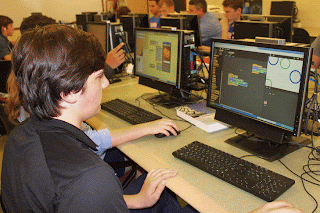English and drama teacher Mr. Van Amburgh started the ball rolling by bringing all of his classes to the computer lab to participate in Hour of Code. How cool is that? An English teacher promoting computer education!
Spurred by Mr. Van Amburgh's enthusiasm, I spontaneously arranged for a Friday the 13th event.
Be on the lookout for details! pic.twitter.com/maePhrBeP8
— Castle Library (@castlelibrary) December 12, 2013
To be honest, I got not even half of what these coders were saying, so I took note of the following, for further study.
- Eclipse - Open source community website
- Integrated development environment
- GitHub - Collaborative software development
- TheNewBoston - computer tutorials
- LWJL - Lightweight Java Game Library
- sourceforge - Resources for open-source developers
- vlcj - Java Framework for the vlc Media Player
- LISP - Acronym for List Processor
- Scheme interpreters
- Open Source programming - Milo is a strong proponent, as is Aaron
- Arduino - Dylan learned the language in Engineering class
- Codeacademy - Ema notes that the site is chock full of different kinds of programming tutorials
When Mr. Turbeville heard about the Friday the 13th event, he gave his Computer Programming class the option to try Hour of Code.
Here are reflections from two of of Mr. Turbeville's students:
...I tried a few of the programming resources, including the Snap program from UC Berkeley. In this program, I was able to manipulate shapes through simple block coding. I would definitely recommend Snap to someone as a good tool for starting out as it introduces you to the concept of setting commands.
I also checked out the Khan Academy 'Intro to Programming' videos. In the 'Intro to Drawing' video, I learned how the coordinates of shapes translate into codes called function calls. In the 'Intro to Coloring' video, I also learned about function calls but the numbers in these functions did not represent coordinates but instead the amounts of red, green, and blue in the color.
I am most interested in learning the basics of programming because it allows me to see past the exterior face of websites and programs, and at the sophisticated language that lies hidden below. I love how many sources there are out there to help me do that!
--Anna E.
I played the game Light-bot and the interactive walk through of Codeacadamy. I also took a small peek at CodeCombat, but it did not seem to interest me too much. I liked Light-bot and Codeacadamy because it managed to keep me absorbed into programming. The first one was a rather fun puzzle game, and with Codeacadamy I felt that I was actually learning how to do something more complex than the simple "this.moveUp" "this.moveDown" etc.
I felt that these two programs in particular could help draw people into programming. While many of these programs looked fairly intriguing, I can understand why some might view programming as hard. Many of these programs are either not games (to attract non-programmers) too complex for basic programmers, or too time-consuming with little reward for many people that have a minor interest in programming. For example, CodeCombat was a game, but it was a rather boring one and after about ten minutes that I had only learned how to move my character up, down, and sideways. For someone who does not know much about programming, this might scare them, as they invested a relatively decent chunk of time with little results. Also, some of these programs don't hold your hand for the first few steps. They tell you the basics, then drop you, expecting you to play catch-up. However, this was only from my observation of about four or so programs. Oh, it would also be nice if the programs were separated into groups based on the users experience level. For example, a beginner level. Maybe around five of these sections, each introducing more complex programs.Thanks again Ms. Lindsay and Mr. Turbeville for giving me this opportunity to have a view at the basic level of programming!
--Matthew L.
Yes, Matthew, we should definitely do more next year!
Best comment heard during the day?
"I'm going to try this at home!" -- 6th grader
(◕‿◕✿)

